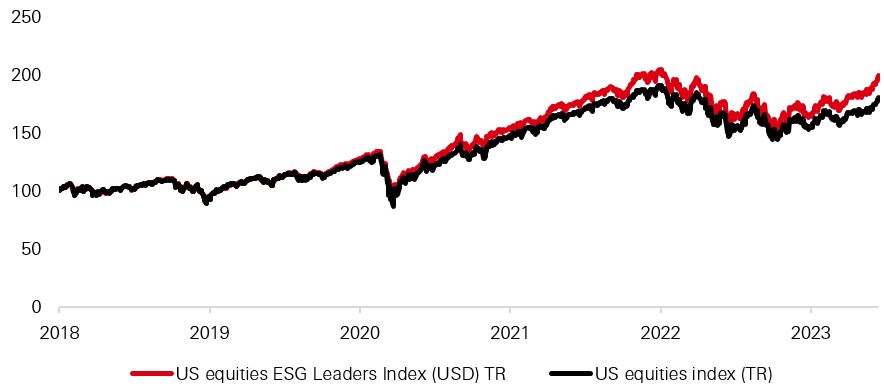
4 Jul 2023
Extreme weather events like droughts and wildfires have become increasingly common and have highlighted the need for solutions to address climate risks. Separately, we continue to see corporations whose business and reputation are damaged for dubious application of their social responsibilities, while others thrive in part because of their positive relationship with consumers and stakeholders. The logic is plain to see. How a company impacts the Environment, broader Society, and approaches its Governance around this - also known as ESG practices - can be material to a company’s prospects and value.
A study by Deloitte last year demonstrated that companies which manage their ESG risks better benefit from higher valuations. The study also found that companies which materially improve their ESG practices benefit even more, with valuations increasing at faster rates than their ESG scores. For example, a 10-point improvement (on a scale of 100) in ESG score nearly doubled the enterprise value to earnings ratio1.
Likewise, our research has also identified a clear performance benefit from ESG momentum, or improvement in ESG scores, at the broader portfolio level. Specifically, looking back over more than a decade of data, we found that tilting allocations towards equity markets with greater ESG momentum at any given point in time would have delivered steady outperformance across the period.
Ratings from data providers are the best means for investors to capture material ESG considerations. Scores can be considered a holistic summary of ESG performance that is linked to the financial and operational risk of a company. Aggregated to the portfolio level, scores provide an indication of exposure to companies with better or weaker ESG practices. The chart below reflects how increasing exposure to ESG leaders has generated improved performance over time. While this is also true going back over longer time periods than shown below, there have also been periods of underperformance in certain years.

Source: Refinitiv Datastream, as of 15 June 2023. Past performance is not indicative of future performance. For illustrative purposes only. US equities index refers to S&P 500.
Typically, ESG scores include multiple pillars and themes that are deemed as key issues relating to the environmental, social and governance categories. For example, MSCI ESG ratings integrate themes like climate change, natural capital, and pollution and waste into the environmental pillar, and human capital and product liability in the social pillar. As environmental and social risks are industry-specific, the methodology of ESG scores goes a step further by focusing on material issues for relevant sectors. Data governance and privacy, for instance, are more relevant to the IT and internet sectors, while labour relations are more relevant to labour-intensive sectors. Governance themes, such as corporate governance and behaviour, are universal issues applicable to all industries. Data points and theme scores are aggregated based on materiality weighting to produce a top score.
Integrating top-level ESG scores, such as the MSCI ESG rating, is a common approach to monitor ESG risks at a portfolio level. A portfolio weighted average ESG score provides a holistic summary of your portfolio’s ESG attributes and can be compared with benchmarks to better navigate potential risk exposures. We consider additional factors, such as ESG improvement within companies and regions, alongside overall ESG scores, to inform investment decisions and further enhance portfolios.
Every company will be impacted by climate change or societal challenges at different times and to a different extent. Investors should take steps to protect portfolios from the financial risks caused by these ESG related issues. While monitoring a portfolio’s ESG performance is a good starting point to consider ESG and sustainability risks, it’s important to consider potential differences in methodology by different ESG rating vendors. Furthermore, more tools and metrics can be used to help investors better understand their portfolio's performance on particular sustainability issues, such as carbon emissions. The availability of these metrics can help investors identify sustainability-related risks and align their investment objectives with their sustainability preferences.
1. Deloitte – ‘Does a company’s ESG score have a measurable impact on its market value?’, 2022. Earnings measurement used is Earnings Before Interest, Taxes, Debt & Amortisation (EBITDA)




This document is prepared by The Hongkong and Shanghai Banking Corporation Limited (‘HBAP’), 1 Queen’s Road Central, Hong Kong. HBAP is incorporated in Hong Kong and is part of the HSBC Group. This document is distributed by HSBC Bank Canada, HSBC Bank (China) Company Limited, HSBC Continental Europe, HBAP, HSBC Bank (Singapore) Limited, HSBC Bank (Taiwan) Limited, HSBC Bank Malaysia Berhad (127776-V) / HSBC Amanah Malaysia Berhad (807705-X), The Hongkong and Shanghai Banking Corporation Limited, India, HSBC Bank Middle East Limited, HSBC UK Bank plc, HSBC Bank plc, Jersey Branch, and HSBC Bank plc, Guernsey Branch, HSBC Private Bank (Suisse) SA, HSBC Private Bank (Suisse) SA DIFC Branch, HSBC Private Bank Suisse SA, South Africa Representative Office, HSBC Financial Services (Lebanon) SAL, HSBC Private banking (Luxembourg) SA and The Hongkong and Shanghai Banking Corporation Limited (collectively, the “Distributors”) to their respective clients. This document is for general circulation and information purposes only. This document is not prepared with any particular customers or purposes in mind and does not take into account any investment objectives, financial situation or personal circumstances or needs of any particular customer. HBAP has prepared this document based on publicly available information at the time of preparation from sources it believes to be reliable but it has not independently verified such information. The contents of this document are subject to change without notice. HBAP and the Distributors are not responsible for any loss, damage or other consequences of any kind that you may incur or suffer as a result of, arising from or relating to your use of or reliance on this document. HBAP and the Distributors give no guarantee, representation or warranty as to the accuracy, timeliness or completeness of this document. This document is not investment advice or recommendation nor is it intended to sell investments or services or solicit purchases or subscriptions for them. You should not use or rely on this document in making any investment decision. HBAP and the Distributors are not responsible for such use or reliance by you. You should consult your professional advisor in your jurisdiction if you have any questions regarding the contents of this document. You should not reproduce or further distribute the contents of this document to any person or entity, whether in whole or in part, for any purpose. This document may not be distributed to any jurisdiction where its distribution is unlawful. The following statement is only applicable to HSBC Bank (Taiwan) Limited with regard to how the publication is distributed to its customers: HSBC Bank (Taiwan) Limited (“the Bank”) shall fulfill the fiduciary duty act as a reasonable person once in exercising offering/conducting ordinary care in offering trust services/ business. However, the Bank disclaims any guarantee on the management or operation performance of the trust business.
© Copyright 2023. The Hongkong and Shanghai Banking Corporation Limited, ALL RIGHTS RESERVED.
No part of this document may be reproduced, stored in a retrieval system, or transmitted, on any form or by any means, electronic, mechanical, photocopying, recording or otherwise, without the prior written permission of The Hongkong and Shanghai Banking Corporation Limited.